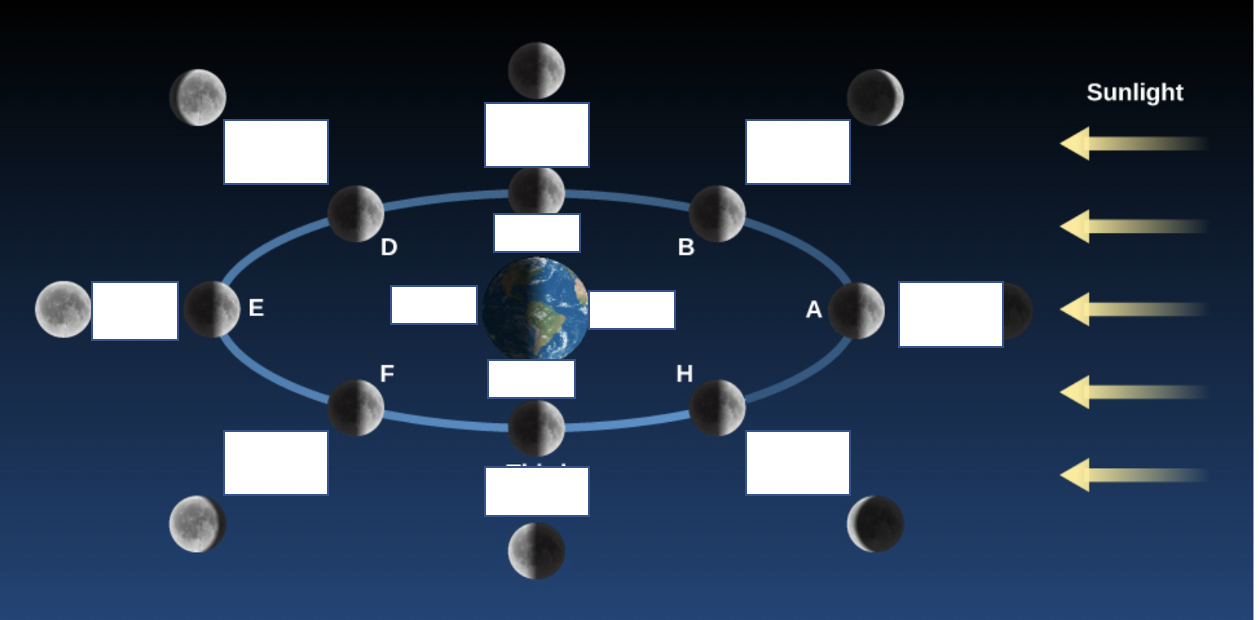5 Chapter 5 – Why does the moon have phases?
OpenStax Astronomy Chapter 4 Section 5: Phases and Motions of the Moon
The Moon
I. The
A. Only see one of the Moon
B. : one full on axis in the same time to make one full around Earth
1. Causes only one side to face at all times
Suppose you are standing on the side of the Moon that faces the Earth. How would earth appear to move in the sky as the Moon made one revolution around Earth?
A. The Earth would not move at all.
B. The Earth would rise and set.
C. The Earth would move across the sky but not rise and set.
D. You could not see the Earth.
C. Moon shines because of reflected (like a mirror)
D. of the Moon’s full surface is always , because the Sun is always shining
E. of the Moon describes how much of the bright/lit side we from Earth
Phases
II.
A. Caused by the between Sun, Moon and Earth, by Earth’s shadow!
B. : Moon between Earth and the Sun, appears because lit side is facing from Earth
C. : Between New Moon and phases, thin shape
D. : Moon at angle with Earth and the Sun, happen at the end of the Quarter and Quarter of the cycle
E. : Between Quarter and Moon phases, “humpback” shape
F. : Moon on side of Earth from the Sun, appears fully lit
G. : side is lit, half of cycle when Moon is getting “ ” toward Full Moon (waxing crescent, waxing gibbous)
H. : side is lit, 2nd half of cycle, getting ” “ toward New Moon (waning crescent, waning gibbous)
I. Cycle through all in a as Moon orbits Earth
1. Four : about one week between New, First Quarter, Full, Third Quarter and New again
If tonight the Moon is in the waxing gibbous phase, in three days the Moon will most likely be in the:
A. New phase
B. Third Quarter phase
C. Full phase
D. First Quarter phase
Resources
NAAP Lunar Phase Simulator: https://astro.unl.edu/naap/lps/animations/lps.html
Tutorial Activity – Moon Phases
“Elementary Astronomy Worksheet Handout 4: Moon Phases, Eclipses” (modified by Kaisa E. Young) by Catherine Whiting via OER Commons, licensed under CC BY 4.0, https://oercommons.org/courses/elementary-astronomy-worksheets
2. Use Figure 1 below for the following:
(a) Label the positions of the new, full, first quarter, and third quarter moons on the plot above.
(b) There are tick marks on Earth. Label noon, midnight, 6am, and 6pm. Earth spins counterclock-
wise in the figure.
(c) Why doesn’t the Moon’s phase change during the course of one night? Explain your reasoning.

Sidney Wolff via OpenStax, licensed under CC BY 4.0
3. (a) When is the full moon high up in the sky, noon, midnight, 6am, or 6pm?
(b) When is the new moon high up in the sky, noon, midnight, 6am, or 6pm?
4. Suppose you go outside and notice that the Moon is half-light and half-dark. Light side is the left side.
(a) What phase is it?
(b) How much of the total surface (full sphere) of the Moon is actually lit up by the Sun?
5. Why do we only see one side of the moon?
6. Suppose you are living on the moon. Let’s think about what it would be like.
(a) How long is a day on the moon?
(b) Is there a ‘dark’ side to the moon?
(c) How would the Earth look?
(d) Would you be able to see the Earth from everywhere on the moon?

